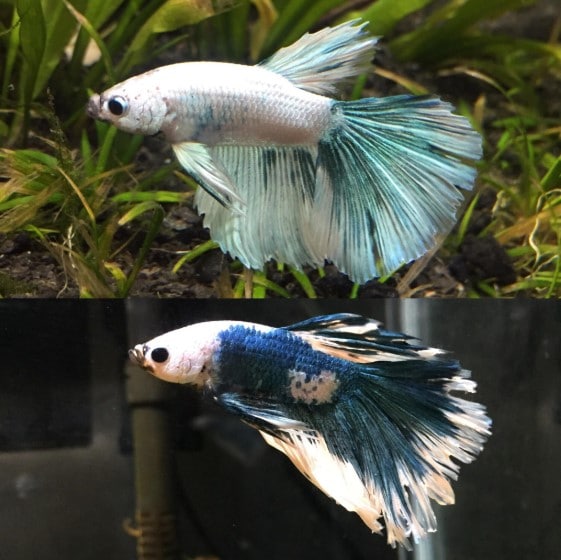Why Is My Betta Turning Black
Betta fish are known for their bright and vibrant colors, which is why it can be concerning to see a color change in your beloved pet. One of the most common questions among betta fish owners is: "Why is my betta turning black?" This article will explore the reasons behind this color change and what you can do to help your fish.
Pain Points
Seeing your once-vibrant betta turn black can be alarming. Not only does it look unhealthy, but it could also be a sign of underlying health issues. Furthermore, it can be difficult for owners to identify the root cause of the problem and how to address it effectively.
Answering the Question
The betta fish's coloration is related to both genetics and environmental factors. While genetics play a significant role in determining the fish's coloration, stress and poor maintenance can lead to color loss. Stress in betta fish can be a result of several factors, such as poor water quality, inadequate nutrition, and over-crowded tank conditions. Poor water quality and over-crowding can also lead to infections and illnesses that can cause black discoloration. However, it's worth noting that some bettas turn black as a natural part of the aging process.
Summary of Key Points
In summary, there are several reasons why a betta fish may turn black, including genetics, stress, illness, inadequate nutrition, and poor water quality. Owners should ensure that their pets receive proper care, including a clean and adequately sized tank, adequate nutrition, and a stress-free environment. Identifying the underlying cause of the color change is key to addressing the problem effectively.
Personal Experience and Explanation
As a betta fish owner for several years, I've experienced color changes in my fish. One of my bettas, for instance, turned black as he aged. It was a natural part of his maturing process, and he remained healthy and active throughout the color change. However, another betta I owned turned black as a result of poor water quality. He began to appear lethargic and less active, and I noticed that his fins were starting to deteriorate. After consulting with a veterinarian, I boosted the tank's filtration and maintenance, and the color change gradually reversed.
Therefore, it is essential for owners to carefully monitor their betta fish and identify any changes in behavior or appearance as early as possible. Understanding the underlying cause of the color change can help in deciding the necessary corrective measures and preserving the fish's health and well-being.

Treatment Options
If poor water quality and overcrowding are the root cause of the color change, the first step is to improve the fish's environment. Owners must maintain a clean tank and introduce adequate filtration and aeration systems to ensure a stress-free environment for their betta. Additionally, ensuring that the fish receives adequate nutrition and a balanced diet can also help prevent color loss. However, if the color change is a sign of underlying illness, consulting with a veterinarian is the best course of action. In severe cases, medication and treatment may be necessary to restore the fish's health and vibrancy.
Preventive Measures
As they say, prevention is better than cure. Owners should establish regular maintenance routines that include tank cleaning, water testing, and other preventive measures to ensure their fish are healthy and happy. Providing a stress-free and nutrient-rich environment can go a long way in avoiding color loss in betta fish and preserving their vivid colors well into their golden years.
Question and Answer
Q: Can betta fish change colors naturally?
A: Yes, betta fish can change colors naturally as part of their maturing process. Sometimes, black coloration is a sign of age and can indicate a healthy and well-cared-for fish.
Q: How can I tell if my betta is stressed?
A: Signs of stress in betta fish include lethargy, color loss, aggression, and fin deterioration. Monitoring your fish's behavior and appearance regularly can help identify stressors early and prevent serious health problems.
Q: Can betta fish recover from color loss?
A: Yes, betta fish can recover from color loss with adequate care. If the color loss is due to poor water quality or overcrowding, improving the fish's environment can stimulate color restoration. However, If the color change is due to an underlying health condition, a veterinarian's attention may be necessary.
Q: Can overfeeding cause color loss in betta fish?
A: Yes, overfeeding can lead to poor water conditions and affect the fish's overall health and coloration. Owners should provide a balanced and appropriate diet and avoid overfeeding their pets.
Conclusion
Betta fish are beautiful and popular pets, and their vibrant colors are a significant part of their appeal. Understanding the causes of color loss, particularly why betta fish turn black, can help owners identify and address the problem effectively. Proper maintenance, adequate nutrition, and a stress-free environment are key to preserving the fish's health and vitality well into their golden years.
Gallery
Help! Why Is My Betta Fish Losing Color? (Turning White/Black?)

Photo Credit by: bing.com / betta illnesses lethargic
Why Are The Tips Of My Betta's Fins Turning Red? He Is An Adult Male

Photo Credit by: bing.com / betta fins bettas ventral
Why Is My Pink Betta Turning Black? | My Aquarium Club

Photo Credit by: bing.com / betta
Betta Fish Losing Color – All You Need To Know

Photo Credit by: bing.com / betta
Help! Why Is My Betta Fish Losing Color? (Turning White/Black?)

Photo Credit by: bing.com / betta